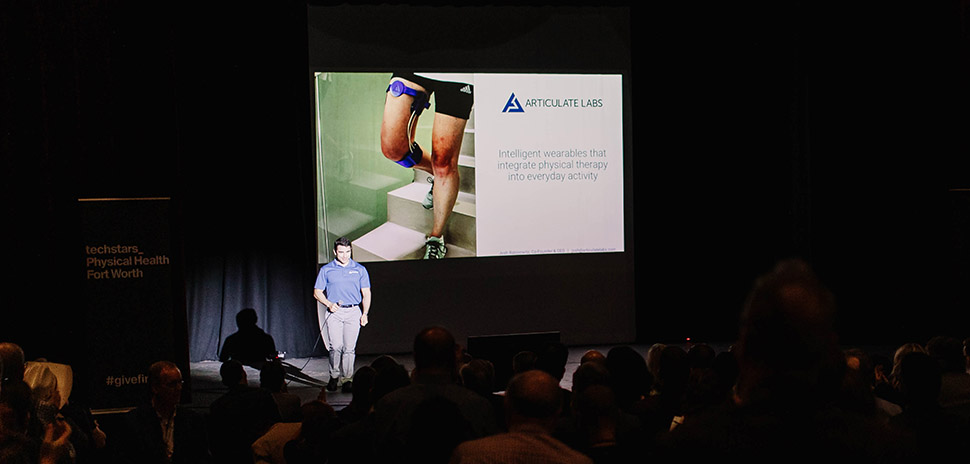Dallas, TX
Dallas’ Articulate Labs, Military Consortium Awarded $1.3M to Test Knee Injury Wearable Tech
Articulate Lab’s Josh Rabinowitz presenting at Techstars Demo Day in Fort Worth in December 2022. [Photo: Techstars]
Dallas startup Articulate Labs, based out of Biolabs Pegasus Park, has been awarded $1.3 million by the Orthopaedic Research and Education Foundation, the Medical Technology Enterprise Consortium (MTEC), and the U.S. Army’s Medical Research and Development Command.
“This award will fund a study using our novel wearable devices to accelerate return to duty for West Point Cadets recovering from ACL reconstruction,” said Articulate Labs CEO and Co-Founder Josh Rabinowitz in an email to Dallas Innovates.
The non-dilutive funding was awarded to a consortium that includes the startup, Keller Army Community Hospital, and the Henry M. Jackson Foundation. Together, they hope to improve outcomes and return-to-duty timelines for service members suffering major knee ligament injuries.
Knee injuries plague active-duty service members, making up 22% of all musculoskeletal damage, according to the news release. The most severe knee injury, ACL tears, come with lengthy 6- to 12-month recovery periods post-surgery.
Many service members also face high re-injury risks thanks to incomplete rehab. Articulate Labs aims to address this unmet need with its wearable technology that delivers rehab with less clinician oversight.
The funding supports a clinical study of Articulate’s KneeStim device at the Keller Army Community Hospital. Starting in February 2024, 60 patients will use device during rehab after ACL surgery.
MTEC, one of the funding consortium, has a mission to facilitate the prototype advancement of technologies that “protect, treat, and optimize the health and performance of U.S. military service personnel.”
The award is a significant milestone for Articulate Labs as it validates and scales its technology. The startup is an alum of the 2022 Techstars Physical Health Fort Worth accelerator program.

Articulate Labs’ CEO and Co-Founder Josh Rabinowitz shows the startup’s wearable technology at Techstars Demo Day in Fort Worth. [Photo: Techstars]
Turning everyday activities into strength builders
Articulate Labs’ Rabinowitz is on a mission to revolutionize physical rehabilitation and make it more accessible.
“We do what we do because movements—the ability to walk, the ability to use our bodies is so essential to our identities, our role in this world,” Rabinowitz said at a Techstars demo in December.
Rabinowitz left politics to develop a wearable device that provides in-home neuromuscular stimulation as a result of his co-founder and partner Herbie Kim’s struggles with knee osteoarthritis and missed therapy appointments. The startup’s KneeStim device, he says, turns everyday activities into strength-building exercises.
“If the patient can’t come to physical therapy, we should try to bring it to them,” Rabinowitz said. The idea is to make physical therapy more convenient, and his goal is to “double strength recovery” versus traditional methods and reduce costs.
Starting in Texas, the company wholesales to durable equipment suppliers who can rent to clinics, allowing reimbursement and revenue.
Rabinowitz said Articulate Labs experienced significant growth and “basically doubled” its team during its time with Techstars, forging relationships with new facilities for future pilots and trials.
Get on the list.
Dallas Innovates, every day.
Sign up to keep your eye on what’s new and next in Dallas-Fort Worth, every day.